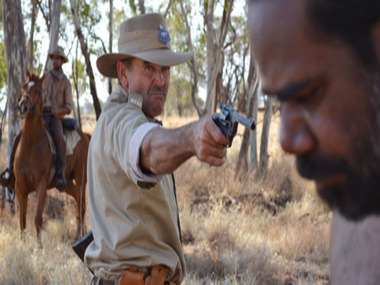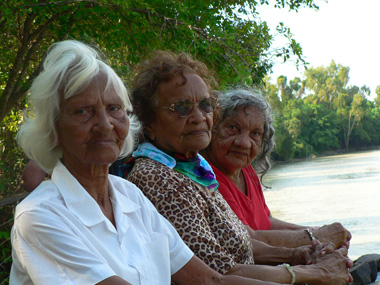BLACKFELLA FILMS

Constable Murray carries out the Coniston Massacre
Posted by Jeremy Eccles | 15.06.12
A welcome change at the Sydney Film Festival was a special program of Indigenous films – Australian and international. This appears to be a move out of the Opera House by Rachel Perkins's Blackfella Films, where their Message Sticks film festival has been an annual event. It's also a continuation of her determination to ensure that all Aussie films with Indigenous subject-matter are produced and shown under Indigenous control.
In the light of that, the three Indigenous documentaries that I saw offered mixed messages:
MABO
This is the touching and slightly over-long tale of Eddie 'Koiki' Mabo's life, love for wife Bonita and the bolshie nature which lead him into the Trade Union movement, to his arrest for demanding equality in the pubs and hotels of Jo Bjelke-Peterson's Queensland, and ultimately lead him to fight right up to the High Court for his family land on Mer/Murray Island in the Torres Strait.
Jim Bani (of The Straits) and Deborah Mailman are a beautiful couple, who age appropriately over the 30+ years that remained of Koiki's life – she greying, he turning into the late, great Bob Maza! But, 20 years on, it's the Mabo Case that we really care about rather than the people, isn't it? After all, the Mabo Case Papers were one of the first two Australian documents nominated for UNESCO's Memory of the World International Register along with Cook's Endeavour journal. I suspect director Rachel Perkins thought differently, however, wanting to create a hero we can identify with – however flawed - rather than to analyse the legal intricacies of a convoluted case that had such significant ramifications for the doctrine of Terra Nullius.
But she does cleverly weave the many pitfalls in the case into the couple's lives – especially when another set-back turns the now frequently suited Eddie into the wild one of old, threatening violence to his beloved Bonita. It makes the ultimate victory for Mer Islanders (Mabo was just the front name on the legal case) all the more bitter-sweet, for Koiki had died 5 months earlier.
More significantly, he never got to live back on Mer – something he'd promised his adoptive Dad he would do. Land, as ever with Indigenous people, is the key to life – whether Torresian or Aboriginal. Oddly, Perkins makes little attempt to explain the Mabo lineage factor on Mer which gave Koiki his land rights. Arguably it was the key to understanding the cockiness which pushed him to fight for his rights, but it also made him unloved by both the white 'Protectors' in his life and some of his fellow islanders.
It was brave of the Aboriginal Perkins, however, to leave in the line from Koiki, “We're not just another bunch of Aborigines chucked off their lands and shoved into dormitories”, which underlines the superiority felt by people in the Torres Strait, who – with the help of Christian missionaries – avoided the fate of mainland Aborigines, especially in Queensland, and were thus able to simply prove a continuous relationship with plots of land that predated 'The Coming of the Light' in 1871.
THE CONISTON MASSACRE
In 1982, recently arrived in Australia, I was glued to the TV screen watching a Channel 9, I think, reconstruction of the Coniston Massacre of Aborigines in the bush 300 kms NW of Alice Springs just 53 years earlier. In my memory, the dramatised killings were accompanied by documentary of a land rights claim being adjudicated on land that still held utter misery in its soul for the Warlpiri people involved.
It was no doubt accurate, as John Cribbin's 1984 book, 'The Killing Times' was – much quoted in the Wikipedia entry on Coniston. But they were a White view of events.
Now the new documentary from the Pintubi Anmatjere Warlpiri Media team headed by Francis Jupurrula Kelly is the Indigenous view. It's fascinatingly different in its approach despite employing pretty much the same mix of documentary and drama. For the interviewees are either survivors of the massacre – babies at the time – or generations descended directly from massacre victims, and the power of the oral histories offered is potent. Clearly the ensuing 80 years have involved much tribal discussion of what happened and why – and the apportionment of a share of the blame to Bullfrog, the Warlpiri man who murdered dingo-trapper Fred Brooks for stealing his wife, was pretty universal.
But the drought, which Warlpiri recall so clearly, and which brought all parties to the same contested water soakage – Brooks because he was laid off from Coniston Station, Bullfrog and family because they were nomads unable to survive elsewhere – was written out of history by the Federal enquiry which whitewashed the massacre. Just 31 'justified' deaths were recorded at the hands of the retributive parties lead by Constable Murray. At least a hundred is the Warlpiri estimate including women and children - but excluding Bullfrog, who lived on until 1959 in Yuendemu! Non-Indigenous attitudes – and corroboration of the Warlpiri memory - can be found in a letter to the editor from a settler, published the day after the government report was brought down, insisting that the drought made “the life of one ewe worth more to Australia than all the blacks that were ever here".
Small wonder that PAW Media's David Batty condemns 'The Killing Times' as “semi-fiction”. But one of the delights of his film is it too contains equally fictional or possibly magic-realist elements, such as Bullfrog's ability to make his footprints disappear through song - an intriguing way of explaining his survival.
The work is an important development in Aboriginal story-telling, comparable to the 'junba' in the East Kimberley which became the live performance, 'Fire, Fire, Burning Bright' at festivals in Perth and Melbourne in 2002, about the Bedford Downs Massacre.
CROKER ISLAND EXODUS
Stylistically disappointing in comparison – it's an old-fashioned 'white' doco beside Coniston – this gentle saga of moving 95 'Stolen Generation' kids from Croker Island off Arnhemland to Sydney under threat of Japanese invasion in 1942 is a charmer rather than a ball-tearer. Three of the 'half-caste' kids are now charming old ladies – delighted to recall their madcap youth, moved by meeting up with the 99 year-old Sister who lead their exodus, and quietly traumatised by the whole disaster that was associated with the taking them away from their families.
Surprisingly, that matter formed a fairly small but moving part of the film. And one discovered why when these stolen children looked back on their lives – remote Croker Island and its Methodist Sisters was the only home they'd really known in their young lives; and attempting to reconnect with their Black families had proved both painful and apparently unsuccessful.
So it was with mixed feelings that the audience at the film's Sydney Film Festival premiere heard out Sister Margaret Somerville – author of the book that had started the film off – justifying the 'stealing' of her young charges even today. “They were expected to be nothing better than domestic labour”, the feisty 99 year old insisted; “and we were out to prove that wrong. They could take their place in White society if they wanted; and I was so proud to see them in Darwin with their families (when she went North to launch her book in the film) – some of them nurses, some teachers. It would never have happened if they'd stayed on the stations” where their families were living in the 1930s.
The film mixes the old ladies' memories with reconstructions of a small group of kids and a much younger Somerville taking a boat to the mainland, being picked up in ancient trucks to go to Oenpelli; and finding there that no one cared much about them in the chaos after the bombing of Darwin, which left them to walk 100 kms to the Pine Creek railway head that would eventually get them to Sydney.
At Otford, they had a fun 4 years – including having to invent birthdays for themselves because the white schoolkids they encountered were miffed at not being invited to any parties! It was done by drawing months and days out of a hat – and it stuck.
Mabo has already been seen on the ABC – though could still be picked up in I-View; Coniston and Croker will be seen on the ABC screens later this year.
URL: www.sff.org.au
Share this:
»  del.icio.us
»
del.icio.us
»  Digg it
»
Digg it
»  reddit
»
reddit
»  Google
»
Google
»  StumbleUpon
»
StumbleUpon
»  Technorati
»
Technorati
»  Facebook
Facebook
Contact Details

Alice Briston, Netta Cahill and Jessie Waters - stars of Croker Island Exodus
Further Research
News Tags: ABC TV | Blackfella Films | Croker Island | Eddie Mabo | Indigenous films | Mabo | Rachel Perkins | Stolen Generations | Sydney Film Festival | the Coniston Massacre
News Categories: Blog | Feature | Festival | Industry | Media | News
Exhibition Archive
- 10.10.17 | TARNANTHI 2017
- 11.08.17 | Natsiaas 2017
- 20.07.17 | APY ART DOMINATES THE WYNNE
- 17.07.17 | Anangu Artist Wins $100,000 Prize
- 14.07.17 | The End of AAMU
- 11.07.17 | ART ACROSS THE COUNTRY
- 11.07.17 | TARNANTHI IN OCTOBER
- 05.07.17 | TJUNGUṈUTJA - from having come together
- 13.06.17 | Ghost-Nets Straddle the World
- 07.06.17 | Grayson Perry Going Indigenous?
- 05.06.17 | Barks Bigger than Ben Hur
- 27.05.17 | NGA QUINQUENNIAL 2017
- 21.05.17 | Blak Douglas Finds Home at the NGA
- 21.05.17 | BRIAN ROBINSON WINS HAZELHURST WOP
- 18.05.17 | PARRTJIMA 2.0
Advertising

